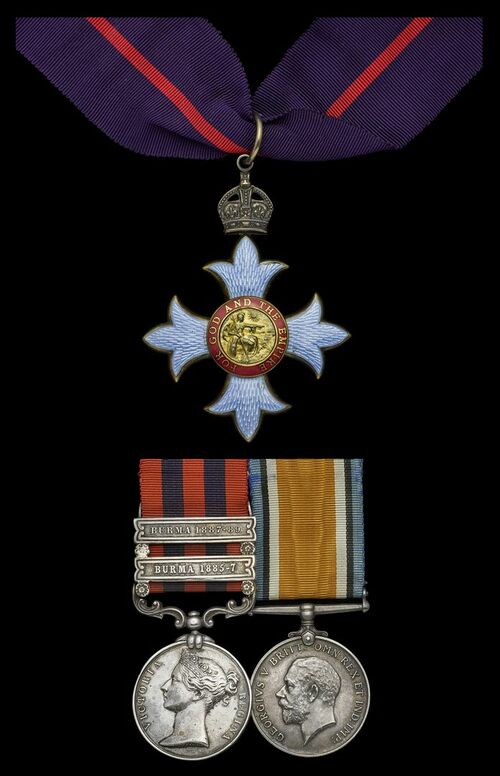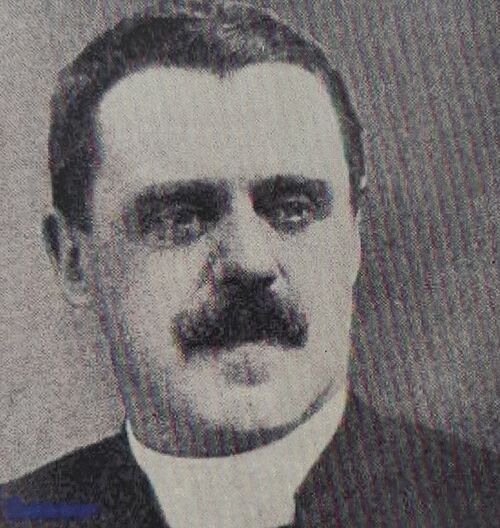Auction: 24001 - Orders, Decorations and Medals
Lot: 149
A Great War C.B.E group of three awarded to Brigadier-General Reverend J. H. Bateson, Royal Army Chaplain's Department, who was Chaplain to the Upper Burmah Field Force 1886-89 and later Principal Chaplain to the Forces (Wesleyan) during the Great War
The Most Excellent Order of the British Empire, 1st Type, Military Division, Commander's (C.B.E.) neck Badge, silver-gilt and enamel, in its Garrard & Co. case of issue; India General Service 1854-95, 2 clasps, Burma 1885-7, Burma 1887-89 (Revd J. H. Bateson. Mad. Estab.); British War Medal 1914-20 (Rev. J. H. Bateson), the last two mounted as worn, minor contact wear to first, overall good very fine (3)
C.B.E. London Gazette 3 June 1919.
Joseph Harger Bateson was born at Kendal, Westmorland in January 1865, the son of Sarah and Thomas Bateson J.P. Educated first at the Friends' School, Kendal and later at Queen's College, Taunton after which he attended the University of London, matriculating in January 1882. Having joined the military as a Chaplain Bateson was sent with British troops to Burma as apprentice to Reverend W. B. Simpson. The Free Church Army Chaplain 1830-1930 by J. H. Thompson states:
'The 1888 Report notes that "happily all [Chaplain's] service with one exception have been in peace". The exception was in upper Burma where the Rev. J. H. Bateson has ministered to our troops engaged in pacifying that newly acquired territory ...... He has founded a Soldier's Home in the Palace at Mandalay. On disbandment of the forces he is recommended to transfer to the unoccupied garrisons of N. W. India.'
The medal roll notes his presence in theatre between 1 May 1887-14 April 1888. After the end of hostilities Bateson travelled to India where he was secretary of the Royal Army Temperance Association in India from 1889. While here he married Rose Edmeades at Calcutta on 5 April 1892. The Free Church Army Chaplain 1830-1930 adds:
'This is the point at which Wesleyan Chaplaincy work in India began to develop and Watkins attributes the spread of garrison chaplaincies in the Punjab to Bateson's efforts as General Superintendent of the Bombay and Punjab District. In 1891 [SIC] Bateson became secretary of the Royal Army Temperance Association in India, in which post he came to Lord Roberts' notice. Temperance in the Victorian Army, not least in India, where a quarter of the troops were members of the Association, had strong official support.'
Having returned to Britain by 1911 Bateson was appointed Honorary Chaplain to the Forces, Territorial Army on 10 June. He resigned his position on 11 October 1913 but returned to service during the Great War, being appointed Principal Chaplain to the Forces (Wesleyan) with the equivalent rank of Brigadier-General in 1917.
During this time Bateson was a Member of the Interdenominational Advisory Committee Chaplaincy Services at the War Office. Also representative for the Methodist Church at the Admiralty and Air Ministry he would later be General Secretary of the Soldiers' and Sailors' Homes of the Methodist Church.
Bateson died at Wandsworth on 5 October 1935; sold together with an extract from The Free Church Army Chaplain 1830-1930 as well as medal rolls, M.I.C. and London Gazette extracts as well as census data and a copied photograph.
Subject to 20% VAT on Buyer’s Premium. For more information please view Terms and Conditions for Buyers.
Sold for
£850
Starting price
£750







